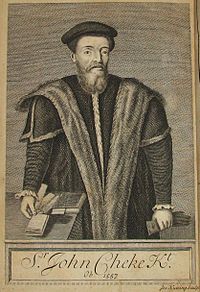 Sir John Cheke died on September 13, 1557. He had been a great scholar at University of Cambridge, reformer of the mode of pronouncing Greek, and the tutor to Prince Edward, later Edward VI.
Sir John Cheke died on September 13, 1557. He had been a great scholar at University of Cambridge, reformer of the mode of pronouncing Greek, and the tutor to Prince Edward, later Edward VI.According to this site, he also took part in the change in succession from Princess Mary to Lady Jane Grey, and that clearly got him into some trouble when Mary I came to the throne:
His zeal for the protestant religion induced him to concur, on the death of Edward VI, in the settlement of the crown on the Lady Jane Grey, and he acted as secretary of state during her brief reign. Immediately after Queen Mary's accession he was committed to the Tower on an accusation of treason, 27 July 1553. He was discharged from custody on 13 Sept. 1554, and about the same time obtained a pardon and the royal license to travel abroad. After residing for some time at Basle he went to Italy, and at Padua he met some of his countrymen, to whom he read and interpreted some of the orations of Demosthenes. Subsequently he settled at Strasburg, where he read a Greek lecture for his subsistence.
At the beginning of 1556 he resolved to go to Brussels, where his wife was, chiefly in consequence of a treacherous invitation from Lord Paget and Sir John Mason. As, however, he was a firm believer in astrology, he first consulted the stars to ascertain whether he might safely undertake the journey, and fell into a fatal snare on his return between Brussels and Antwerp, for, by order of Philip II, he and Sir Peter Carew, with whom he was travelling, were suddenly seized by the provost-marshal on 15 May, unhorsed, blindfolded, bound, thrown into a wagon, conveyed to the nearest harbour, put on board a ship, under hatches, and brought to the Tower of London, where they were placed in close confinement. The alleged ground of his committal was, that having obtained license to travel, he had not returned to England by the time specified in his license.
In the Tower he was visited by two of the queen's chaplains, who tried in vain to induce him to alter his religious opinions. The desire of gaining over so eminent a man caused the queen to send to him Dr. Feckenham, dean of St. Paul's, a divine of moderate and obliging temper. Cheke had been acquainted with him in the late king's reign, and had tried to convert him to protestantism when he was a prisoner in the Tower. Cheke's courage began to fail at the prospect of the stake, and he was at his own request carried before Cardinal Pole, who gravely advised him to return to the unity of the church. Cheke dared hold out no longer, and Feckenham had the credit of effecting his conversion. He made in writing a profession of his belief in the real presence, and sent the paper by the dean of St. Paul's to the cardinal, with a letter dated from the Tower on 15 July, praying that he might be spared the shame of making an open recantation.
This request being refused, he addressed to the queen on the same day a letter in which he declared his readiness to obey all laws and orders concerning religion. After this, in order to declare his repentance for his rejection of the pope, he made a formal submission before the cardinal, as the pope's legate, and after being absolved he was received back into the Roman church. He was kept in prison for upwards of two months before he was allowed to make his public recantation. This was done on 4 Oct. in the most public manner before the queen, and for the sake of greater formality the reading of the palinode was preceded by an oration addressed to her majesty by Feckenham. Cheke was also obliged to read a longer form of recantation in presence of the whole court, and to promise to perform whatever penances might be enjoined upon him by the legate. After having submitted to all these humiliations he was released from the Tower, and regained his lands, which, however, he was forced to exchange with the queen for others.
Pining away with shame and regret for his abjuration of protestantism, he died on 13 Sept. 1557 in Wood Street, London, in the house of his friend Peter Osborne, remembrancer of the exchequer.
No comments:
Post a Comment